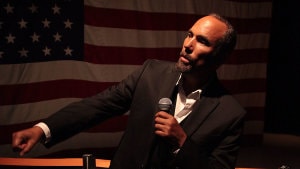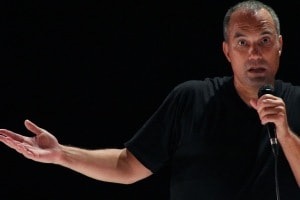“This year has been all about going back and forth between Rodney King and Frederick Douglass,” said writer/performer Roger Guenveur Smith in a recent phone interview from his home in Los Angeles. And, he might add, between the East and West Coasts: Smith will bring his solo show Rodney King, about the unfortunate figure at the center of the wrenching 1992 L.A. riots, back to New York for a short run at Brooklyn’s BRIC House, Dec. 3-7, after acclaimed runs across the country (Woolly Mammoth Theatre Company in D.C., L.A.’s Bootleg Theater, NY’s Under the Radar Festival).
But the historical distance between King, a construction worker famously beaten by the LAPD but ultimately defeated by drug and alcohol abuse, and Douglass, the brilliant and hugely influential 19th-century orator, is clearly the gap that is haunting Smith. In Frederick Douglass Now, Smith repurposes Douglass’s writings to address contemporary American issues; in Rodney King, he interrogates the late beating victim in a kind of rhetorical vacuum, then delivers his entire impromptu speech—the one that began, “People, I just want to say, Can we all get along?” Between the two men’s stories (and their famous speeches) gapes more than a century of African-American struggle, progress and retrenchment, and the narrative is far from linear.

“I had referenced Rodney King in my work for 20 years,” said Smith, whose history-based solo works have also included A Huey P. Newton Story and Juan and John. Indeed, at the KAOS Gallery in Leimert Park in 1991, Smith recalled, “I did an improvised piece right after he was beaten, which eerily enough kind of predicted what would happen: that the cops wouldn’t be convicted. We recognize early on that this was a kind of seminal moment in human relations.”
Smith recalled being devastated by the news of King’s death in 2012; King drowned at age 47 in his own backyard pool after a night of heavy drinking, not long after he published an autobiography and went on a successful media tour to promote it. It was only a few months later, Smith said, that he was up onstage workshopping an early version of the show.
“It was shocking; I was very moved,” Smith said of King’s death. “I wanted to know why. Why did this guy matter to me? I never met him, but he’s someone who always had my sympathies.”
Smith, though born in Berkeley, Calif., was moved to L.A. at a young enough age that considers himself “an L.A. kid, a Dodger fan.”
A sun-kissed youth in the City of Angels had its flip side: “The riots were the bookends of my childhood and my younger adulthood,” he said, referring to the one in Watts in 1965 and the one that engulfed much of L.A. in 1992.
Both were quintessentially L.A. conflicts that began behind the wheel, with California Highway Patrol traffic stops of African-American drivers that escalated, with the arrival of the notoriously paramilitary LAPD, into bruising struggles. And both famously metastasized into full-blown urban uprisings, complete with fires, vandalism and retributive violence on both sides.

Eerily, in both cases, the young black men whose stops for reckless driving incited the riots—Marquette Frye in ’65 and King in ’92—led troubled lives thereafter, and like King, Frye died young, at age 42.
In researching the subject of his piece, Smith uncovered other unsettling narrative echoes within King’s own story.
“There were all kinds of strange coincidences and cross-references,” he said. “He and Reginald Denny had worked together—they knew each other,” Smith said, referring to the white truck driver who was brutally beaten during the riots. While learning that King was a second-generation alcoholic was hardly surprising, another inheritance struck Smith: “He was a second-generation drowning victim; his father had expired in his bathtub. You can’t write anything more Biblical than that.”
Smith—whose next projects include a piece about the building of the Panama Canal and a play, to be written with Richard Montoya, about race relations in post-WWII Venice, Calif.—even goes so far as to say that when he did the show at Woolly Mammoth in D.C., and had the occasion to reread the words of Lincoln’s Gettysburg Address, he thought of King.
“‘Those who here gave their lives that that nation might live’—I think that’s applicable to Rodney King,” said Smith. “His life was sacrificed in a certain way so that we might more clearly see this country.” Smith added, without even having to invoke the names of Michael Brown or Trayvon Martin: “I don’t know if we clearly got the message, but it’s one worth paying attention to.”


